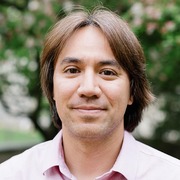
Michael Ing is a Professor in the Department of Religious Studies and the Director of the Native American and Indigenous Studies Program, with courtesy appoints in the Department of Philosophy and the Department of East Asian Languages and Cultures. Michael studies accounts of the human condition in early and medieval China as well as in traditional Hawaiʻi. He is interested in questions about vulnerability, resilience, and how human beings construe relationships with each other and the world we inhabit.
Michael has two current research projects. The first looks at themes of grief and resilience in the work of Tao Yuanming (c. 365 - 427), a Chinese poet and intellectual. Utilizing the study of grief and mourning to talk about the loss of life and other meaningful things, he looks at ways in which Tao coped with disappointment and disaffection as he left his post as a government official to farm his homestead. Tao’s life is marked by dashed hopes, melancholy, and a resilient gaiety that inspires his poetry. In the end, he believes that the thought of Tao Yuanming allows for the exploration of what it means to be resilient in a world where one cannot fulfill one’s most righteous desires.
The other research project examines ʻIke Hawaiʻi (Hawaiian thought). Until fairly recently, most scholars writing about Hawaiʻi did not make use of Hawaiian language sources, despite having more sources in Hawaiian than almost any other Indigenous language. Ing's research makes use of these materials to ask questions about what it means to be human from Hawaiian perspectives—Where do we come from? How are we related to other things in the world? How do we live a good life? He also writes about Hawaiian identity in light of nearly half of Hawaiians living beyond the islands of Hawaiʻi.

Professor Black has received fellowships from Harvard University, UCLA, the Ford Foundation, and Cherokee Nation. Her current project, How to Get Away with Murder, provides six case microhistories, arguing that the current crisis is a historic reflection of settler colonial relations with Indigenous people. How to Get Away with Murder will be published with Johns Hopkins University Press in 2025. She is a 2024-25 Racial Justice Fellow at Harvard Kennedy School and Associate Professor at Indiana University.
Black examines the intersections of representation and violence. As a citizen of Cherokee Nation, she developed a lifelong interest in studying Native identity and struggle and detailing the history of Native people’s encounters with violence from citizens and the state. She employs the disciplines of history, Native American studies, film studies, and gender studies to creatively combine traditional archives, oral history, storytelling, and tribal histories. Her work has appeared in more than 20 academic and non-academic outlets. Her work has appeared in academic and non-academic forums, including NPR podcasts, the PBS video series Origins, and international news outlets such as El País.
Her first book, Picturing Indians: Native Americans in Film, 1941-1960, was published in 2020. She serves on council for both the Native American and Indigenous Studies Association and the Western History Association. She is the Series Editor for New Directions in Native American Studies at University of Oklahoma Press and is co-editing a forum in the American Historical Review on Native people and the carceral state.
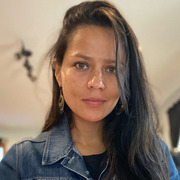
Olga Rodríguez-Ulloa has recently co-edited the anthology Punk! Las Américas Edition, Intellect Books, 2021. The volume takes a hemispheric view of punk as a manifestation of a heterogeneous and contentious Americas. Contributors examine punk scenes all the way from Alaska to the Mapunkies in Patagonia. Punk! Las Américas Edition highlights the nexus between punk, queerness, and social class, and examines punk’s contaminating genre practices via its connections with cumbia and reggaeton. Punk takes on other established forms of artistic expression like literature, visual arts, and photography are articulated together in unexpectedly critical ways. “An academic book through and through, the transgressions this volume performs run the risk of becoming exemplary.” Marisol de la Cadena (UC Davis).
Rodríguez-Ulloa’s current solo book project, Sadistic Cholas: Sex and Violence in Contemporary Peru, explores the political resignification of the racial slur chola as it is now deployed by queer trans-feminist performers, authors, and collectives who advance a transfeminist critique via their aesthetic use of violence in sex and politics. Using a hemispheric critical framework that incorporates Black, Latinx, and Indigenous studies, the manuscript theorizes the long durée of the chola’s racialization and sexualization in the Andean context alongside current reappropriations of the term. Departing from representations of Peru’s 1980s war, the book explores potential connections between women’s participation as armed militants and the feminist present.
In future research, Rodríguez-Ulloa plans to delve into US archival materials around South American immigrants and the largely dormant character of their stories within the dominant US imaginaries of Latinidad. In short, she is interested in how Andean and Amazonian peoples might represent conflictive or complementary notions of otherness that destabilize contemporary Latinx perspectives.
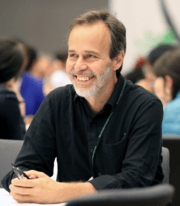
At Indiana University Bloomington, Eduardo S. Brondizio has developed a research program in Environmental Anthropology that is collaborative and international, interdisciplinary and problem-oriented, and, particularly dedicated to understanding rural and urban populations and landscapes and the transformation of the Amazon. For most of his career, he has studied small farmers and rural households in Eastern Amazonia as they have interacted with commodity markets, development programs and policies, social movements, and environmental-climate change. For the past decade, his research has extended to the analysis of rural-urban household networks, urbanization and urban problems, and the governance of indigenous areas and conservation units in the region. As a microcosm of global predicaments and diversity, marked by development contradictions, social inequalities, and accelerated environmental change, the Amazon has provided an entry point to engage on collaborative research focusing on global change and sustainability. Brondizio has strived to maintain a field-based, comparative and longitudinal research program that combines ethnography, survey, institutional analysis, geospatial methods, ecological assessments, and historical investigation, grounded in a belief that empirical analysis, theory and methodological development are inter-dependent. Brought together, he sees his research as contributing to an ‘ethnographically-grounded complex systems perspective’ to the study of regional and global change. This implies examining regions such as the Amazon as dynamic social-ecological-political-historical landscapes emerging from interacting local, regional, and global processes, and defying simplistic interpretations and one-size-fits-all solutions and policies.
As expressed in various publications and research projects, Brondizio cherishes opportunities to work together with colleagues and students in Anthropology, as well as across the social and natural sciences, the humanities, and with local collaborators. He values disciplinary expertise, but also sees his work contributing to the breaking down of barriers across disciplines and knowledge systems and advancing problem-based conceptual frameworks and approaches to the study of human-environment interactions, development and inequality, environmental governance and sustainability. He feels privileged to work on these issues with colleagues and students in the Department of Anthropology, the Center for the Analysis of Social-Ecological Landscapes (CASEL), the Ostrom Workshop, the Sustainable Food Systems Science project, and other communities at Indiana University and beyond.
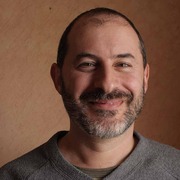
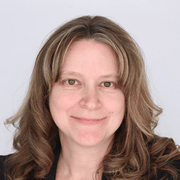
Heather's research is in preserving fraternal and religious memorabilia and collections and finding innovative ways to engage new audiences with primary sources and collections. Her most recent publication (with co-author R. Bishop) is entitled "Augmented archives: engaging students in archives and special collections through augmented reality technology," which is a chapter in Augmented and Virtual Reality in Libraries (Rowman and Littlefield: 2018).
She is a cofounder (with colleague Raven Bishop) of The Augmented Archives Project, an initiative designed to leverage emerging technologies to increase access to and engagement with primary source materials. Their project was awarded a 2018 Campus Technology Impact Award in the category of Education Futurists.
A member of the Cherokee Nation, Heather is a native New Mexican, born and raised in Albuquerque. She serves on the national Board of the Archives for the Episcopal Church, is a co-founder and director for the Historical Society for American Fraternalism and a board member for the J.H. Rathbone Museum and Resource Center. Heather is an active volunteer with Alpha Chi Omega and was awarded Outstanding Organization Advisor in 2016 and 2018.
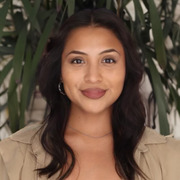
Leslie Del Carpio specializes in Sociolinguistics, with a primary research focus encompassing Heritage Language Studies and Pedagogy, as well as Language Variation. Within the realm of Heritage Language Studies, she investigates the efficacy of Critical Language Awareness in enhancing the educational experiences of Spanish Heritage Language Learners, particularly examining their community-building dynamics within the state of Indiana. Additionally, her research delves into the morphosyntactic characteristics of Spanish varieties in the United States, aiming to contribute to studies that establish their linguistic legitimacy. This investigation extends to the analysis of prevailing linguistic attitudes and ideologies surrounding these varieties and their speakers.
On the language variation front, her work explores diverse morphosyntactic features of Spanish in contact with Quechua and Kichwa in varieties of contact and migratory regions in Peru and Ecuador. Furthermore, she hold a role as co-principal investigator in the Peruzonians project, an initiative dedicated to creating a Living Archive of the Peruvian Migrant Experience in Arizona. The project's core mission centers on promoting interculturality and nurturing a strengthened sense of identity among Peruvian migrants in Arizona.
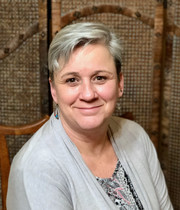
Andrea Sullivan-Clarke is an Associate Professor at Indiana University Bloomington (IU) in the Department of History and Philosophy of Science and Medicine with a joint appointment in the Native American & Indigenous Studies (NAIS) Program.
Her research focuses in on the social dynamics of knowledge generation communities, to include the Indigenous communities of Turtle Island (North America). Sullivan-Clarke has published and presented on scientific reasoning and practice, notably the use of analogical reasoning and its influence on the work of Charles Darwin and 19th century science on human difference.
A first-generation college student and member of the Wind clan of the Muscogee Nation, Sullivan-Clarke has published on various topics relevant to Indigenous communities, such as land acknowledgement statements, allyship, and settler ignorance. She is the editor of Ways of Being in the World: An Introduction to Indigenous Philosophies of Turtle Island (Broadview Press, 2023), an anthology for non-Indigenous instructors who want to teach Indigenous Philosophy.
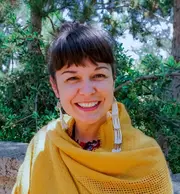
Brandie Macdonald, current director of the Indiana University Museum of Archaeology and Anthropology, previously served as senior director of decolonizing initiatives at the Museum of Us in San Diego, California.
As a curator and scholar, Macdonald has led the creation of a number of exhibitions during her tenure at the Museum of Us, including “Colonial Legacy: The Museum’s Façade” and “Maya: Heart of the Sky, Heart of the Earth.” A dedicated museum professional and Indigenous citizen of the Chickasaw Nation with ancestral ties to the Choctaw Nation, Macdonald’s references refer to her as “a rising cultural leader.”
Macdonald also held key roles at First Peoples Fund in Rapid City, South Dakota, and The Heritage Center at Red Cloud Indian School in Pine Ridge Indian Reservation, South Dakota. She is also teaching remotely at the University of Victoria in British Columbia, with a focus on Indigenous stewardship practices and repatriation policy.
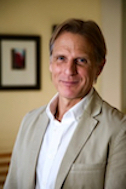
Richard Henne-Ochoa is Director of the Institute for Indigenous Knowledge at Indiana University and a member of the IU faculty. A linguistic anthropologist, his work focuses on traditional Indigenous ways of communicating, Indigenous language documentation and restoration, intangible cultural heritage, and community-driven research partnerships that foreground Indigenous ways of knowing and communicating.
His current projects include:
Documenting Diné and Lakota Ways of Communicating, a three-year collaboration with the Phoenix Indian Center and Thunder Valley Community Development Corporation, supported by the NEH and NSF. This project creates digital audiovisual archives of Navajo and Lakota communicative practices to support language revitalization and uphold Indigenous data sovereignty.
Rematriating Intangible Cultural Heritage, a partnership with IU Libraries and the Arikara, Dakota-Lakota, Nakoda, and Pawnee nations. This initiative transfers stewardship of IIK's digital collections back to the communities from which they originated and develops a model for co-equal university-tribal partnerships in rematriation.
Speaking from the Heart: Displacement, Recovery, and Voice in Lakota Discourse, a book project with Charles Underwood (UC Berkeley). Drawing on ethnography, archival materials, and community collaboration, the book examines how Lakota speakers—across historical and contemporary contexts—use voice to navigate power, sustain relationality, and enact cultural and linguistic recovery.
Across these initiatives, Henne-Ochoa emphasizes relational accountability, co-governance, and Indigenous sovereignty, working to sustain languages and cultural lifeways while transforming how universities collaborate with Indigenous nations.
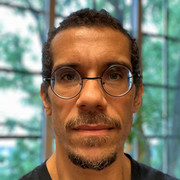
Alexus McLeod's main areas of research are early Chinese Philosophy, Mesoamerican Philosophy, and Africana Philosophy and Religion. He takes a global approach to philosophical issues, aiming to develop adequate accounts of issues through investigation of multiple global traditions. Much of McLeod's recent work focuses on varying application of global philosophical methodologies and the study of systems of global synthesis in early China, Mesoamerica, India, Persia, and West Africa, among others. The aim of all of this is to construct new frameworks for intellectual history and the history of philosophy on the basis of cross-tradition methodology, concerns, and participants (texts, thinkers, artifacts, etc). McLeod also works on philosophical issues in the history of medicine, and the history and philosophy of the traditional Asian martial arts. He is also editor of the journal The Philosophical Forum.

Dr. Ricky Camplain's (Comanche, she/they) research is on disease prevention and health promotion among incarcerated people. Her primary focus is on understanding, in partnership with communities, the health needs of those at the intersection of being Indigenous and incarcerated. She employs community based participatory research and epidemiologic methods to determine how culture, policy, and the social, structural, and Indigenous determinants of health in the correctional system can impact health, health behavior, and social justice.
Dr. Camplain is committed to ensuring opportunities for safe, fulfilling research experiences for undergraduate and graduate students during their time at Indiana University and other institutions.
Dr. Camplain has established partnerships across the country that include:
- The Hualapai Tribe Juvenile Detention and Rehabilitation Center
- The Hualapai Tribe Adult Detention Center
- The Hualapai Green Reentry Program
- Monroe County Detention Center
- The Navajo Department of Corrections
- Yavapai County Sheriff's Office
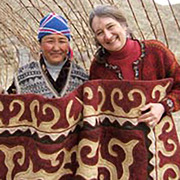
Most of Anne Pyburn's primary research has taken place in Belize, where she has directed major excavations and general mapping and reconnaissance in the remains of three ancient Maya cities. The focus of her research in Belize has been on understanding and reconstructing very large systems of human organization that developed before the modern world system, for which the Maya provide a crucial example as one of the few places in the world where urbanism developed independently. When Pyburn was in graduate school, these were called early states or complex societies. Her investigations have led her to believe that such terms are teleological; they served the purpose of introducing early scholars to interesting foci of comparison between cultures, but have reached the end of their usefulness and now impede our ability to perceive ways of life not derived from the model. The narrowness of this view channeled investigation into the reification of “rises” and “collapses,” models of such oversimplification that they are impossible to disprove. So while her primary research continues to document dramatic organizational variation and invention, impressive technological changes and volatile political economy, Pyburn sees these processes as historical rather than as developmental.
As scientists, archaeologists need to be aware of the sociopolitical agendas they contribute to with their research and be braver about addressing the issues they really believe in. Pyburn believes archaeologists are best prepared to face the political present as teachers with ideas and information based on their study of the past that are relevant to policy decisions. They are not qualified to make those decisions or to dictate the future, but knowledge is power and they can use it to make a difference. For example, might an uncritical focus on the power of elites and the glory of kings reinforce a worldview among our admirers and students that we don’t actually believe in or want to promote? Might the perpetuation of a model that organizes world cultures into an historical trajectory that evolves naturally to become a hierarchical state reflect more of the political present that it teaches about the past? Is it really either scientific or desirable to provide this uncritical validation for the status quo? Once you get started it’s easy to come up with similar questions about they way we approach gender, labor, technology and other facets of past societies. Are we asking questions in such a way that the ascendancy of a particular sort of political economy is always confirmed?


